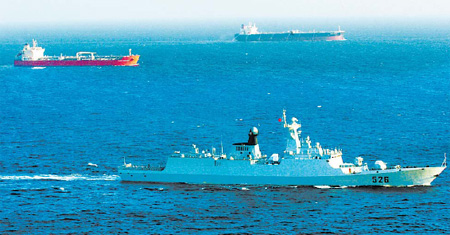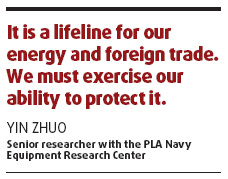Foreign and Military Affairs
Anti-piracy special: Calming troubled waters
By Li Xiaokun and Peng Kuang (China Daily)
Updated: 2009-12-29 08:02
 |
Large Medium Small |
After three months patrolling the coast of Somalia, Huang Xi understands better than most what the navy's escort mission means to sailors on the pirate-infested waters.
The 21-year-old was among the second batch of soldiers from the People's Liberation Army sent to the troubled region on three Chinese naval ships on Dec 26 last year.
 The Wenzhou frigate escort Chinese merchants on Nov 13 in the Gulf of Aden. [Guo Gang]
|
"With the burning sun and fierce sea winds, it was hard to stand on the deck for more than half an hour," said Huang, from Hubei province. "Yet I saw two crewmen on one ship stand for more than two hours holding the Chinese flag in salute of our helicopter."

The helicopter in question was carrying several Chinese special forces troops on their way to protect a Chinese merchant vessel. "When they arrived on the boat, the special forces soldiers were all shocked to find almost every crew member on deck to welcome them. It was like a grand reception," said Huang.
|
||||
It was just another ordinary day for the first PLA troops ever sent abroad by Beijing to protect national interests. The unprecedented move followed a United Nations mandate allowing foreign navies to patrol the Gulf of Aden, which lies off the east coast of Africa.
Deployment of the fleet, which left port in Hainan province, drew close attention from around the globe.
As of Christmas Day last week, China had sent four naval fleets carrying a total of more than 3,300 troops to guard the troubled waters. They have escorted more than 1,300 merchant ships, including 405 foreign vessels and 18 from Taiwan province.
The Chinese navy has been credited with rescuing eight Chinese ships and foreign vessels from the hands of pirates.
"So far the success rate of our escort mission has been 100 percent," said Wu Zhigang, an officer on the Shenzhen, a PLA Navy destroyer that was part of the second escort fleet. "Many foreign ships wait five to six days for the Chinese navy to arrive as they believe it is safer to stay with us."
Chinese vessels did not only fight independently but also established close cooperation with more than 40 foreign boats in the region. They held exchange visits, sent emails and even held joint exercises, said PLA Navy officials.
For Peng Aobiao, an officer with the South China Sea Fleet involved in the first escort fleet, it was not until they arrived in the Gulf of Aden did he truly understand why the Chinese navy had been sent there.
"It is such a prosperous scene. Batches of oil tankers, and more than 1,000 Chinese ships pass by the area annually. Our country has huge business interests there," he said.










